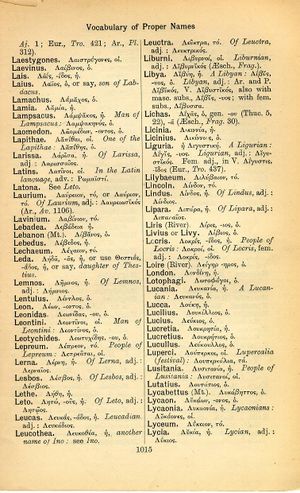Lais
ἰχθύς ἐκ τῆς κεφαλῆς ὄζειν ἄρχεται → the fish stinks from the head, a fish rots from the head down, the fish rots from the head down, fish begin to stink at the head, the fish stinks first at the head, corruption starts at the top, the rot starts at the top
English > Greek (Woodhouse)
Λαΐς, -ΐδος, ἡ.
Latin > English (Lewis & Short)
Lāïs: ĭdis and ĭdos, f., = Λας,
I the name of two courtesans of Corinth celebrated for their beauty.
I Lais, who flourished during the Peloponnesian war: dicitur et multis Lais amata viris, Ov. Am. 1, 5, 12; Cic. Fam. 9, 26, 2 (acc. Laida); Prop. 2, 6, 1 (gen. Laidos).—
II Lais, a contemporary of Demosthenes, Gell. 1, 8, 3 sqq.; Plin. 28, 7, 23, § 81.—Acc. plur.: Laidas et Glyceras, lascivae nomina famae, Aus. Epigr. 18, 1.
Latin > French (Gaffiot 2016)
Lāis,¹⁵ ĭdis ou ĭdŏs, f. (Λαΐς), deux célèbres courtisanes de Corinthe : a) au temps de la guerre du Péloponnèse : Cic. Fam. 9, 26, 2 ; Ov. Am. 1, 5, 12 ; Prop. 2, 6, 1 ; b) contemporaine de Démosthène : Gell. 1, 8, 3 ; Plin. 28, 81.
Latin > German (Georges)
Lāis, idis u. idos, Akk. idem u. ida, f. (Λαΐς), Name von zwei berühmten Hetären zu Korinth. Die ältere, zur Zeit des peloponn. Kriegs lebende, war eine Zeitgenossin des Aristippus, Cic. ep. 9, 26, 2. Prop. 2, 6, 1. Lact. epit. 39, 7. – die jüngere, Zeitgenossin des Apelles und Demosthenes (Gell. 1, 8. § 3 sqq.), war angeblich Erfinderin einiger Arkana, Plin. 28, 81 sq. – Akk. Plur. griech. Lāidas, Auson. epigr. 17, 1. p. 200 Schenkl. – Vgl. Jacobs Verm. Schr. Bd. 4. S. 398 ff.

